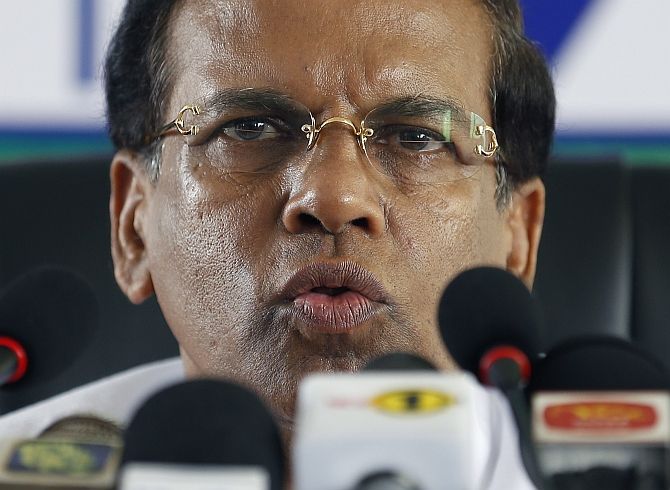 Sri Lanka's new President Maithripala Sirisena on Monday unveiled his cabinet that included members from a cross-section of parties and announced fresh parliamentary polls in 100 days, two years ahead of schedule.
Sri Lanka's new President Maithripala Sirisena on Monday unveiled his cabinet that included members from a cross-section of parties and announced fresh parliamentary polls in 100 days, two years ahead of schedule.
Sirisena announced a 27-member cabinet, including an Indian-origin Tamil leader, headed by the Prime Minister Ranil Wickremesinghe.
The cabinet consists of members from many opposition coalition parties which had backed Sirisena's election campaign.
"Soon after our 100-day programme, we will hold a parliamentary election and remember that this is only an interim government," he said at the Presidential Secretariat where the ministers were sworn-in.
"Win over those who did not vote for us at the presidential election (January 8),” Sirisena said.
In the run-up to the polls, Sirisena based his campaign on a 100-day reform programme to introduce constitutional and democratic reforms. He pledged a national unity government with the participation of all political parties represented in Parliament.
Sirisena, 63, has promised to transfer most of the executive powers to Parliament and allow independent commissions to run the public service, the police, the judiciary and the elections department.
The Marxist Janatha Vimukthi Peramuna or the People's Liberation Front and the main Tamil party, Tamil National Alliance, stayed away from taking ministerial berths.
Sirisena had received overwhelming support from the Tamil and Muslim minorities in his victory over the formidable Mahinda Rajapaksa, the former president, who is seen as being popular among the Sinhala majority community for defeating the Tamil Tigers after a nearly three decades-long civil war.
Palani Digambaram from the central hill area districts of Tamils of Indian-origin was appointed Minister of Estate Infrastructure Development while the Sri Lanka Muslim Congress leader Rauff Hakeem was appointed the Minister of Urban Development.
Sirisena kept the defence ministry portfolio for himself and gave foreign affairs to top opposition figure Mangala Samaraweera, who had held the post under the Rajapaksa administration between 2005 and 2007.
Arjuna Ranatunga, Sri Lanka's former cricket captain, was made the Minister of Ports and Shipping.
Nine state ministers and eight deputy ministers also took oaths before President Sirisena.
Rajapaksa's Health Minister until late November, Sirisena defected to become the opposition unity candidate in the January 8 polls. He emerged victoriuos in the polls, ending Rajapaksa's 10-year rule.











 © 2025
© 2025